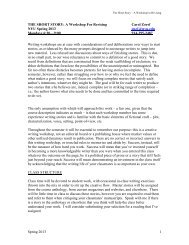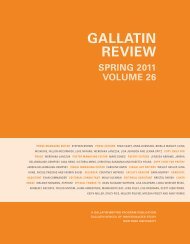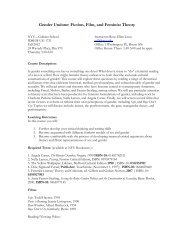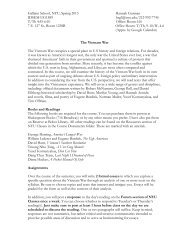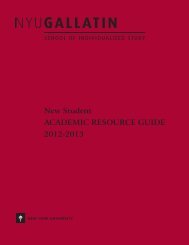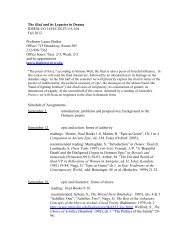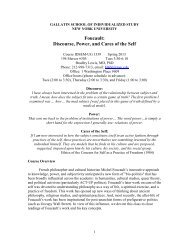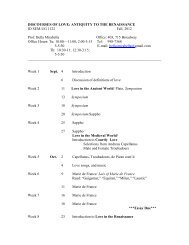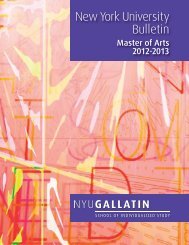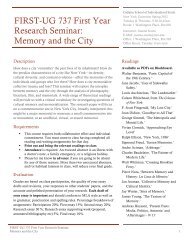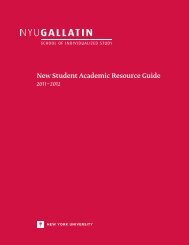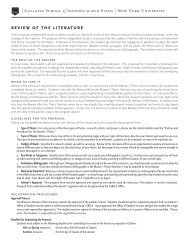New Student ACADEMIC RESOURCE GUIDE 2013-2014
New Student ACADEMIC RESOURCE GUIDE 2013-2014
New Student ACADEMIC RESOURCE GUIDE 2013-2014
Create successful ePaper yourself
Turn your PDF publications into a flip-book with our unique Google optimized e-Paper software.
Unit/Course Load: Usually, a semester’s program consists<br />
of 16 units (four courses of four units each). You can take<br />
as many as 18 units but you should be careful about an<br />
overload in your first semester. Remember that the amount<br />
of studying required to succeed at NYU is likely different<br />
from what you did in high school or at another institution.<br />
(A good rule of thumb: three hours of study time for every<br />
hour in class.) Think of your studies as a full-time job!<br />
On the other hand, remember that the total of 128<br />
units required for the B.A. degree assumes that you will<br />
complete an average of 16 units each semester. If you<br />
complete fewer than 16 units, you will need either to<br />
complete a heavier than normal load in another semester<br />
or to attend a summer session. NOTE: NYU’s flat tuition<br />
fee covers 12-18 units for the Fall and Spring semesters;<br />
tuition in the Summer sessions is charged on a per-unit<br />
rate. If you receive financial aid, please familiarize yourself<br />
with NYU’s policies regarding Satisfactory Academic<br />
Progress. For more information, see: www.nyu.edu/about/<br />
policies-guidelines-compliance/policies-and-guidelines/eligibility-forfinancial-aid.html.<br />
Finding Appropriate Level Courses<br />
Regardless of whether you are a first-year student entering<br />
Gallatin from high school or a transfer student entering<br />
from another NYU school or another university, you will<br />
register for classes prior to Orientation. An academic<br />
adviser will help you select classes relevant to your<br />
intended academic concentration. But how will you know<br />
which courses are right for you?<br />
Most academic departments at NYU require that you<br />
follow their sequence of courses, starting with introductory<br />
lectures and gradually moving to smaller and generally<br />
more difficult advanced seminars. Such requirements make<br />
sense, as students should not enroll in courses for which<br />
they are not prepared. Some departments consider various<br />
forms of advanced standing when determining whether<br />
it is appropriate for a student to bypass an introductory<br />
course.<br />
Advanced Standing: <strong>Student</strong>s who enter Gallatin as<br />
first-year students may receive a maximum of 32 units<br />
for academic work completed prior to matriculation.<br />
Generally, students earn such units by successfully<br />
completing Advanced Placement or International<br />
Baccalaureate programs or by earning grades of B or<br />
better in college or university courses that are not counted<br />
for credit toward their high school diploma. If you have<br />
such units, you will be eligible to post them to your NYU<br />
transcript at the end of your sophomore year.<br />
About AP Scores: NYU students may receive credit<br />
toward the 128-unit degree requirement for results of 4 or<br />
5 on most AP tests. To learn which tests are accepted and<br />
the number of units you may receive, please consult the<br />
Advanced Placement chart on Page 5 or online at http://<br />
bulletin.cas.nyu.edu/page/admission#ape. NOTE: Most medical<br />
schools and graduate health programs require that students<br />
complete the entire pre-med sequence of undergraduate<br />
courses even if they have AP scores that would exempt<br />
them from some courses. If you are a pre-med student, you<br />
should therefore take General Chemistry I, for example,<br />
even if you have units from AP Chemistry. However,<br />
this means that you will lose your AP units. If you have<br />
questions about this, contact your Gallatin class adviser.<br />
Proper Placement: Most NYU departments use AP<br />
scores to determine if it is appropriate for a student to<br />
bypass an introductory course. If you did not take an AP<br />
test but believe it is nonetheless appropriate for you to<br />
skip an introductory course (for example, if you grew up in<br />
a bilingual household and want to take an advanced course<br />
in your second language), contact the department offering<br />
the course in question and ask how to proceed.<br />
About “Pre-Law” Courses: There is no single path<br />
that will prepare you for law school. In developing their<br />
academic concentrations, students interested in the law<br />
should keep in mind that the American Bar Association<br />
has identified some core skills and values that provide a<br />
sound foundation for a legal education, including: analytic<br />
and problem solving skills; critical reading and writing<br />
skills; oral communication and listening abilities; general<br />
research skills; task organization and management skills; a<br />
dedication to serving others and promoting justice.<br />
About Pre-Med Courses: If you intend to apply to<br />
a four-year healthcare professional school you must<br />
complete the sequence of science courses listed on<br />
page 7. Be advised that many medical schools will not<br />
accept AP credit in lieu of courses in the prehealth<br />
sequence. In the spring of your sophomore year, you<br />
should schedule an appointment with one of the advisers<br />
at the Pre-Professional Center in CAS to learn more<br />
about the process of applying to medical and other<br />
health professional schools. A complete list of careers<br />
in healthcare and their undergraduate requirements is<br />
available at www.nyu.edu/cas/prehealth.<br />
6<br />
NYU GALLATIN SCHOOL OF INDIVIDUALIZED STUDY



